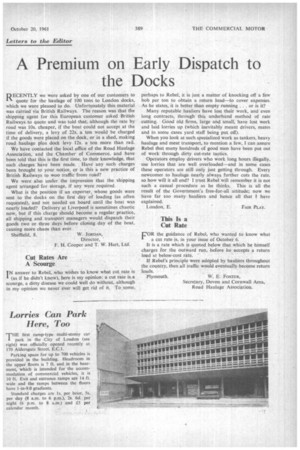A Premium on Early Dispatch to the Docks
Page 81

If you've noticed an error in this article please click here to report it so we can fix it.
110ECENTLY we were asked by one of our customers to " quote for the haulage of 100 tons to London docks, which we were pleased to do. Unfortunately this material was Carried via British Railways. The reason was that the shipping agent for this European customer asked British Railways to quote and was told that, although the rate by road was 10s. cheaper, if the boat could not accept at the time of delivery, a levy of 22s. a ton would be charged if the goods were placed on the dock, or in a shed, making road haulage plus dock levy 12s. a ton more than rail.
We have contacted the local office of the Road Haulage Association, and the Chamber of Commerce, and have been told that this is the first time, to their knowledge, that such charges have been made. Have any such charges been brought to your notice, or is this a new practice of British Railways to woo traffic from road?
We were also under the impression that the shipping agent arranged for storage, if any were required.
What is the position if an exporter, whose goods were sent to the docks on the first day of loading (as often requested), and not needed on board until the boat was nearly loaded? Delivery at Liverpool is sometimes chaotic now, but if this charge should become a regular practice, all shipping and transport managers would dispatch their goods two or three days before closing day of the boat, causing more chaos than ever.
Sheffield, 8. W. JORDAN,
Director, " F. H. Cooper and T. W. Hart, Ltd.
Cut Rates Are A Scourge
1N answer to Rebel, who wishes to know what cut rate is (as if he didn't know), here is my opinion: a cut rate is a scourge, a dirty disease we could well do without, although in my opinion we never ever will get rid of it. To some,
Lorries Can Park Here, Too
TETE first ramp-type multi-storey car park in the City of London (see right) was officially opened recently at 170 Aldersgate Street, E.C.1.
Parking space for up to 700 vehicles is provided in the building. Headroom in the upper floors is 7 ft. and in the basement, which is intended for the accommodation of commercial vehicles, it is 10 ft. Exit and entrance ramps are 14 ft wide and the ramps between the floors have 1-in-9.0 gradients.
Standard charges are Is. per hour, 5s. per day (8 a.m. to 6 p.m.), 2s. 6d. per night (6 p.m. to 8 a.m.) and £5 per calendar month.
perhaps to Rebel, it is just a matter of knocking off a few bob per ton to obtain a return load—to cover expenses. As he states, it is better than empty running . . . or is it?
Many reputable hauliers have lost their work, and even long contracts, through this underhand method of rate cutting. Good old firms, large and small, have lost work and laid lorries up (which inevitably meant drivers, mates and in some cases yard staff being put off).
When you look at such specialized work as tankers, heavy haulage and meat transport, to mention a few, I can assure Rebel that many hundreds of good men have been put out of work through dirty cut-rate tactics.
Operators employ drivers who work long hours illegally, use lorries that are well overloaded—and in some cases these operators are still only just getting through. Every newcomer to haulage nearly always further cuts the rate. so how will it all end? I trust Rebel will remember it is not such a casual procedure as he thinks. This is all the result of the Government's free-for-all attitude; now we have far too many hauliers and hence all that I have explained.
London, E. FAIR PLAY.
This Is a Cut Rate
FOR the guidance of Rebel, who wanted to know what a cut rate is, in your issue of October 6.
It is a rate which is quoted below that which he himself charges for the outward run, before he accepts a return load at below-cost rate.
If Rebel's principle were adopted by hauliers throughout the country, then all traffic would eventually become return loads.
Plymouth. W. E. FOSTER,
Secre_tary, Devon and Cornwall Area, Road Haulage Association.




































































































































